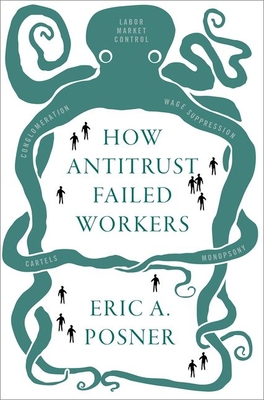

 Oxford University Press, USA
Oxford University Press, USA
How Antitrust Failed Workers


Key Metrics
- Eric A Posner
- Oxford University Press, USA
- Hardcover
- 9780197507629
- -
- -
- Law > Antitrust
- English
 Secure Transaction
Secure TransactionBook Description
Since the 1970s, Americans have seen inequality skyrocket--and job opportunities stagnate. There are many theories of why this happened, including the decline of organized labor, changes in technology, and the introduction of tax policies that favored the rich. A missing piece of the puzzle is the consolidation of employers, which has resulted in limited competition in labor markets. This should have been addressed by antitrust law, but was not. In How Antitrust Law Failed Workers, Eric Posner documents the failure of antitrust law to address labor market concentration. Only through reforming antitrust law can we shield workers from employers' overwhelming market power.
Antitrust law is well-known for its role in combatting mergers, price-fixing arrangements, and other anticompetitive actions in product markets. By opposing these practices, antitrust law enhances competition among firms and keeps prices low for goods and services. Less well-known, antitrust law also applies to anticompetitive conduct by employers in labor markets, which pushes wages below the competitive rate. Yet there have been few labor market cases or enforcement actions, and almost no scholarly commentary on the role of antitrust law in labor markets. This book fills the gap. It explains why antitrust law has failed to address labor market concentration, and how it can be reformed so that it does a better job.
Essential reading for anyone interested in fighting economic inequality, How Antitrust Failed Workers also offers a sharp primer on the true nature of the American economyone that is increasingly uncompetitive and tilted against workers.
Author Bio
Eric Posner is the Kirkland and Ellis Distinguished Service Professor of Law and Arthur and Esther Kane Research Chair.
His research interests include financial regulation, international law, and constitutional law. His books include Radical Markets (Princeton, 2018) (with Glen Weyl); Last Resort: The Financial Crisis and the Future of Bailouts (University of Chicago Press, 2018); The Twilight of International Human Rights (Oxford, 2014); Economic Foundations of International Law (with Alan Sykes) (Harvard, 2013); Contract Law and Theory (Aspen, 2011); The Executive Unbound: After the Madisonian Republic (with Adrian Vermeule) (Oxford, 2011); Climate Change Justice (with David Weisbach) (Princeton, 2010); The Perils of Global Legalism (Chicago, 2009); Terror in the Balance: Security, Liberty and the Courts (with Adrian Vermeule) (Oxford, 2007); New Foundations of Cost-Benefit Analysis (with Matthew Adler) (Harvard, 2006); The Limits of International Law (with Jack Goldsmith) (Oxford, 2005); Law and Social Norms (Harvard, 2000); Chicago Lectures in Law and Economics (editor) (Foundation, 2000); Cost-Benefit Analysis: Legal, Economic, and Philosophical Perspectives (editor, with Matthew Adler) (University of Chicago, 2001).
He is a fellow of the American Academy of Arts and Sciences and a member of the American Law Institute.
- Education
Harvard Law School - JD, magna cum laude, 1991- Yale University - BA, MA philosophy, summa cum laude, 1988
Source: The University of Chicago Law School
Videos








Community reviews
Write a ReviewNo Community reviews